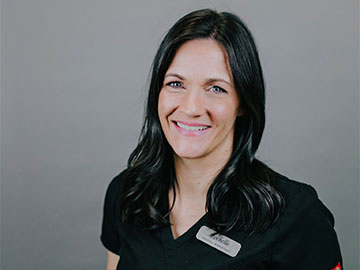
Written and reported by:
Emily Polner
Contributing writer
The idea of going back to school as an adult can be intimidating. However, you don’t have to go it alone. You can earn a degree and land a job in healthcare no matter how long it’s been since you last stepped in a classroom.
Your guide to going back-to-school as an adult
1. Decide what degree you want to pursue

To start a career in healthcare, you’ll need to earn either a certificate, associate degree, or bachelor’s degree. Some careers prefer a bachelor’s degree, but ultimately, your decision to seek a particular level of education should take into account your academic interests, career goals, and the amount of time you’re able to spend studying and attending class.
Careers you can pursue with a certificate
Careers you can pursue with an associate degree
Careers you can pursue with a bachelor’s degree
2. Choose a program that’s right for you

Many adult learners need to manage other responsibilities like family and work. Thankfully, there are more flexible programs designed specifically for those with other commitments. If that’s what you need in order to go back to school, you should look for the following options:
Self-paced programs: These are completed on your own time and don’t start and end with the traditional school year.
Evening or weekend courses: You can sign up for courses that fit into your existing schedule, rather than have to mold your schedule around a typical workday.
Online or hybrid programs: Online or hybrid learning programs are a great option if you don’t live close to a campus, have limited transportation, or limited scheduling options. Online courses often give you 24/7 access to materials and let you meet with students and professors virtually. Note that some healthcare programs require in-person training, in addition to your virtual coursework, in order to finish your program.
Prior learning assessments: Prior learning assessments demonstrate that you’ve mastered certain important concepts and can help you earn your credential or degree more quickly. For instance, if you already have a certificate in dental assisting, you may be able to apply your existing work experience toward an associate degree in dental hygiene, thus reducing the time and cost to earn your degree.
3. Research admissions requirements

Exact admission requirements vary by school and program. Certificate programs tend to have fewer requirements than degree programs. Requirements could include:
If you’re not sure what’s required of you on an application, check with a school’s admissions office for clarification.
4. Research financial aid and scholarships

Grants and scholarships are plentiful, but finding them can be time-consuming. These two paths are worth looking into if you’re trying to reduce the cost of attending school.
Federal loans or Pell grants
Federal loans and grants are available to part-time, full-time, undergraduate, and graduate students alike. In order to get one, you’ll need to submit a Free Application for Federal Student Aid (FAFSA). Keep in mind, federal loans and financial aid are only given out to students who attend accredited institutions. If your institution is not accredited, you won’t qualify.
Scholarships
There are hundreds of scholarships out there for just about any interest or niche. Some are specific to your desired profession, for example, you can find scholarships specific to aspiring dental assistants, physical therapists, radiologic technologists among other occupations. A good way to start your search is to comb through scholarship roundups and lists—you never know what you might find. Scholarships range anywhere from $50 to “full rides” where all education-related expenses are paid.
Your school’s financial aid office may offer special scholarships for adult learners. Your current employer might offer a program that pays for all or some of your tuition through a tuition reimbursement program. Tuition programs are becoming increasingly popular in the healthcare industry.
5. Build a support network

It can take a village to pursue a higher education. You might need to lean on friends or family in myriad ways. Will you need friends or family to help you with childcare while you do your coursework? Will you need to move back in with your family temporarily to save on expenses? These are important factors to consider and plan in advance.
You can also see if your desired schools offer childcare services. Not only will this be a huge help, it’s also a great way to connect with other adult students.
“You’re going to get out of a healthcare degree what you put into it. That means that you need to take care of yourself so that you can face the challenges head-on.”
“You’re going to get out of a healthcare degree what you put into it. That means that you need to take care of yourself so that you can face the challenges head-on. Figure out strategies that best facilitate your learning, don’t compromise on self-care, and if you need something, seek opportunities to get it. Keep people in your life who are supporting you and not distracting you. Take advantage of your resources, ask questions, drink water, and try to get some sleep in the process,” said Enjoli Glanville, nursing student and adult learner.
Why go back to school?
Going back to school can change your life for the better. Some benefits include pursuing your dream career, finishing a degree program you may have started earlier, or increasing your salary. It’s never too late to start a different path.
Glanville emphasized the importance of knowing your ‘why’ and how it can guide you forward.
“Degrees in healthcare are not easy to obtain, and jobs in healthcare are not always easy to manage. It helps to know why you want to pursue the degree or get the job you’re seeking in the first place. My university had us write a philosophy of healthcare that took our pasts and our priorities into account to justify our decision, and I think that practice is a helpful one. When things get difficult, knowing why you’re putting in all this time and effort despite the stress can spell the difference between giving up and moving forward,” Glanville said.
Adult learning is on the rise. In 2020, adult learners (students 25 and older) made up 40 percent of the higher education population in the United States—which equates to nearly 8 million people.

With professional insight from:
Enjoli Glanville
Adult Nursing Student
You may also enjoy:




